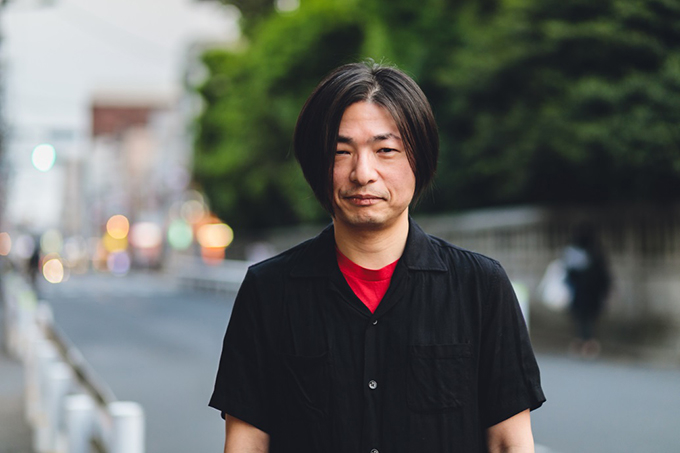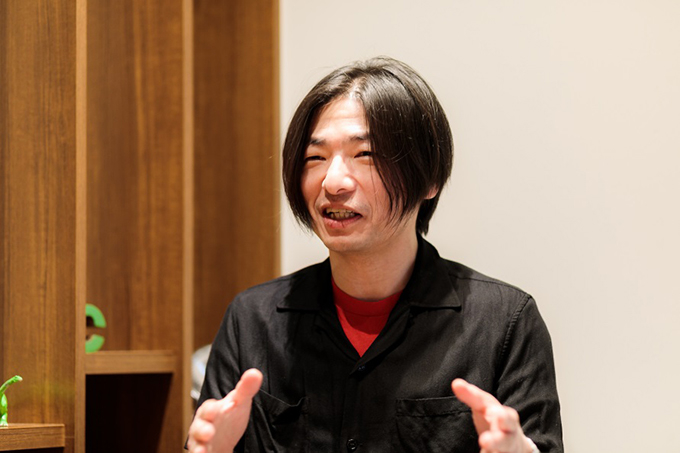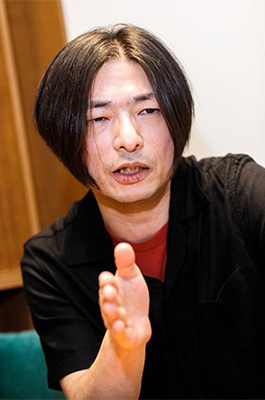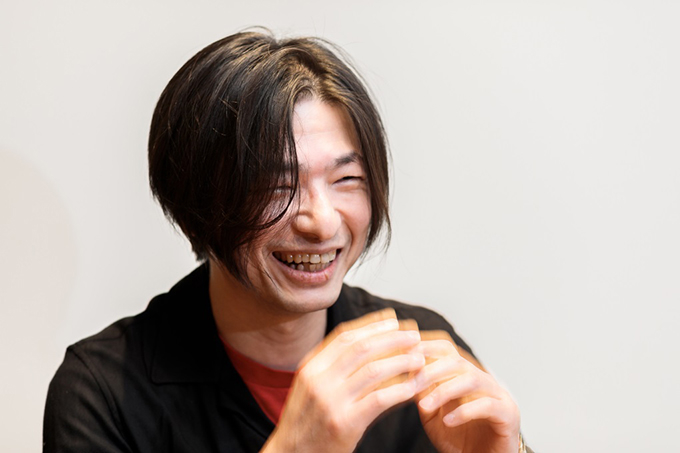Restoring trust in words
2019.10.2
Akutagawa Prize winning author Kazushige Abe was interviewed in advance of the publication of Orga(ni)sm, which follows Sinsemilla and Pistils as the third book of a trilogy that took him about twenty years to produce. He writes in Japanese, but several of his books have been translated into other languages under the Japan Foundation's Support Program for Translation on Japan, and he has given talks and readings in Canada, Thailand, and Italy.

—Did you conceive of this as a trilogy right from the start?
Yes. In fact, I plan ahead with short stories too, not just large projects like this trilogy that stretch to more than a thousand pages. I usually have at least 70% of the story fixed before I start writing. However, part of my writing style includes incorporating actual events pretty much directly into the story. Particularly with Orga(ni)sm, I've brought in a lot of direct quotes from the mass media, so it names plenty of people, like the U.S. President, who everybody is familiar with. I need to get close to the current period to make sure that there's no disconnect between real life and the events in the story. Of course, I'm writing on the presupposition that such a disconnect is going to happen. But I often don't decide details until the last minute.
With the Jinmachi trilogy, I had fixed the overall picture while Sinsemilla was being serialized, but still fleshed the story out further as I went on to write the second and third parts. In that sense, I guess you could say that the plot took twenty years to develop.
—The trilogy is called the Jinmachi Saga because you have created a massive narrative world set in your hometown of Jinmachi, Yamagata Prefecture. Why did you fix on Jinmachi?
One reason is that staging it in a single town lets me produce a dense story, as if it were a group performance by the people who live there, which makes the location a microcosm of the world. That approach came naturally, and the idea for Sinsemilla emerged from that sort of thinking. Nevertheless, I had another reason, too.
The real-life Jinmachi is the town where I was born. My parents' home is still there, and I have family, friends, and acquaintances living there. And I've incorporated part of Jinmachi's history into the trilogy almost verbatim. It's not a part of the town's history to be proud of, so the books aren't all pleasant reading for local people. That's one of the reasons why, as a writer, I'm constantly having to think about things like the relationship between the model for the story and the fictional episodes.
One of the motivations for writing this trilogy was to explore how far away I could get from the actual Jinmachi when I constructed the world that is portrayed. If you think of the first part, Sinsemilla, as being the closest to the true Jinmachi, it's easy to imagine that as the story progresses to Pistils and Orga(ni)sm, the gap from the real Jinmachi will keep growing, so that the density of fiction increases. In that sense, ever since my debut as a writer, I've deliberately surfaced what could be called codes, such as stereotyped names, and then used written descriptions to diverge from the images that would generally be expected. I had already been actively experimenting with expressions that boost this sort of shift in perception and disparity in meaning, but in the latest book, I have gone even deeper, in my own fashion.

—Tell us about your theme of instigating a shift in shades of meaning.
The reason behind that is that until a few decades ago, the genre of literature had attracted reasonably positive expectations. Since then, however, the expectations have been receding, to the extent that there have even been calls to close down literature departments in universities. It is of course possible to argue that literature doesn't need to be of utility to society. Equally, there is a certain amount of rationality behind the calls for abolition. Nevertheless, I have to question the assertion or implication that literature is without utility.
Literature is fundamentally a form of expression that handles only words. Anyone who has taken a basic school education with training in his or her own language should be capable of using words. They are the most-used communication tool worldwide. Because of that, probably, they travel around readily, and new buzzwords spread easily.
Raising suspicions about words that have spread all too easily has surely been one of literature's functions in society. We have to think about whether that way of putting something is really OK, or about what downsides emerge when a good-sounding phrase is on everyone's lips and being used uncritically. Literature has played a role there by providing simulation-like verification in text, and by attempting to rethink the status or positioning of particular words. Once you realize that, the next step is to realize that what the writers of literature should be doing is not “spreading,” but “stirring.”
First of all, literature and other arts can be seen as having an outsider's stance, and that in itself puts literature in the position of being able to identify stereotyped usage. Because of that, we can say that instead of being carried along on the movement of the majority and simply spreading words, literature should be actively stirring them to bring up the voices of the minority. When society is left to its own devices, it tends to produce mechanisms that suit the majority. No matter how much people say that literature is unnecessary, I firmly believe that we need it to stand on the side of the outsider and continue with literary attempts to defend and protect the minority.
I started off by attempting to become a filmmaker, and I never had any academic education in literature. That background makes me something of an outsider in the literary world. That may be why I get a strong reaction to the reality of literature whereby, in the context of the majority doctrine, codes that are stereotypes come into popular usage, functioning as reinforcement for the systems of the majority, and everyone uses them with hardly a second thought.
Anyway, with regard to the situation where there are calls for closing down university literature departments, it should also be said that literature has a role to play in simply maintaining levels of reading comprehension. A literary general education is certainly useful for nurturing the ability to understand and appreciate complicated texts and legal statutes, and I personally feel that teachers should give greater emphasis to that point.

—You are increasingly involved in collaborations between literature and other genres. Do you expect the boundaries between genres to eventually disappear?
In terms of the styles of individual writers, there are no boundaries at all. For literature as a whole, the boundaries change according to the requirements of the times. One often-mentioned example of such change over time comes from the autobiographical novel genre that was the mainstream in modern Japanese literature, where the dominating literary view was that portraying an individual's life in society through a genuine and unembellished description of circumstances and states of mind was “real.” A change occurred around the 1980s, when the media environment expanded. In Japan at least, contact with video culture and subcultures became a part of everyday life. At the same time, every year there were more and more people who had been exposed to such cultural influences since childhood and who grew up taking them for granted. Then, in the 1990s, the general public gained access to the internet, and multimedia became a familiar part of everyone's lives; in fact, society itself became a multimedia society. This progress has been the real experience of our everyday lives over the past 30 years or so.
Before our generation, the subjects depicted and the models referenced by writers were their own selves, the society and communities surrounding them, and the classical works of earlier writers. Now, however, subjects and models include true images culled from the multimedia environments that writers have directly experienced as part of their lives. People with a desire to write novels express their ideas through the format of the novel, but others may equally produce films, music or games. Or today, perhaps content for the web.
—One year after the Great East Japan Earthquake, you wrote in an essay that at a time when people are manipulated by information, you want to restore people's faith in words. How has the situation changed since then?
As far as I can see, the situation is getting worse and worse. I had attempted to describe the precarious situation whereby when somebody posts something that's even a little strange, confidence in the poster crashes, and is unlikely to return without an enormous effort to restore the faith that was lost. For the last ten years or so, I have found it difficult to shake off the impression that the internet emerged on the scene at a point that was too early for humanity, and everyone started using it before we had worked out how to reliably control information. That's a dangerous situation.
It's already well-known that humans are readily influenced by information. Throughout history, time after time, we can see silly situations where people fooled by gossip or ungrounded rumors have made inappropriate decisions or taken inappropriate actions. And then, before we found a good method of prevention, the net came on the scene, making that sort of situation even more likely to happen. Whenever someone talks like this about the harm done by the net, the topic tends to veer towards the facile answer of strengthening regulation. The reality is not that simple. So, what can be done? If you accept that harm can emerge from anywhere, the only solution appears to be to raise the literacy, particularly information literacy, of society as a whole.
That takes us back to the function of literature. Literature is the perfect genre for raising basic literacy. Investigating how to interpret difficult expressions, or how changes in meaning occur when a phrase becomes a buzzword is the domain of literature. Issues like these are being taken up by symposiums or covered in public discussions and talks, which simultaneously emphasize the relevance of the literature genre.
This also relates to the issue of fake news that is currently in the public consciousness. Media reports suggesting that fake news is being used to influence people around the world seem to be true. In some cases, there is a distinct entity manipulating information for its own benefit. In other cases, however, there is no such entity. That case is probably the scariest one.
In situations where people are being misled some sort of nasty rumor that is spreading rapidly with no obvious entity behind it, it is extremely difficult to know how to bring it to a halt. In cases like that, the best defense is preventive measures. Apart from action by the companies that provide the infrastructure, the only effective measure available at the moment is to raise information literacy.

—Have you discussed that sort of idea at the Japan Foundation events around the world? Is this something that you get a better view of as one of the outcomes of cultural exchange?
There should have been discussion of that sort, but even though I'm keen to talk directly with overseas readers, there have been relatively few chances for direct exchange of that sort, and my own lack of proficiency in languages other than Japanese is an impediment, too. Discussion in more depth would probably be possible if I were to go several times and there were a series of opportunities.
—What are your lasting impressions of overseas events organized by the Japan Foundation?
On my first trip, and despite it being my first local publication, I was surprised that so many people came to the symposium and the signing session. Going to another country, meeting people face to face, and shaking hands with them was simply a great encouragement to me.
They were people who were going to read my book from scratch without us providing any context. I would love to hear what sort of impression they got from the book, so I am very keen to approach them more actively.
At the book fair in Bangkok there was a particularly large number of people, both men and women, and of all ages, and there were several very enthusiastic people from the Thai publisher. There were also a number of reporters. All it all, it was extremely gratifying. Since then, I've published another three or so books in Thailand, so I feel a strong attachment now.
—Has it become easier for writers to extend their reach outside Japan?
Just taking a trip to the country is easy, but if you want people outside your own country to read your book, the reality is that you need to prepare the ground by going through a number of barriers first. The more I learn about the industry, the more I realize how much work is involved.
I don't think there are any writers who wouldn't want their works to be read in other countries. All writers surely want more readers for their books, but maybe the strength of that feeling varies from person to person. Nevertheless, I have to admit that it can be quite difficult to achieve. One factor is that for some reason it can be difficult for the foreign publisher to find the appropriate contact in Japan. I suspect it's due to some sort of issue with the way the industry is structured.
Of course, different issues are likely to apply to different writers, but the industry as a whole probably needs to get a deeper understanding of the need for books to be read internationally. Without that understanding, I think it will be difficult to break down the structural issues. In order to contribute to resolving the problem, I want to sell enough of my books to be able to tell everyone how good it is to have readers around the world, but I still need a lot more effort to achieve that. And I probably need to call for more support from the Japan Foundation, too.
Kazushige Abe
Kazushige Abe was born in 1968. He graduated from the Japan Institute of the Moving Image. His debut novel, Amerika no Yoru (American Night, 1994), won the 37th Gunzo Prize for New Writers. Subsequently, Mujo no Sekai (Heartless World) won the 21st Noma Literary Prize for New Writers, and in 2004, Sinsemilla won both the Ito Sei Prize and the Mainichi Publishing Culture Award. In the same year, he also won the 132nd Akutagawa Prize for Gurando Finare (Grand Finale). In 2010, Pistils won the 46th Tanizaki Jun'ichiro Prize. Recent works include Kuesa to 13-banme no Hashira (Quasar and the 13th Pillar), Shikaku (Square), Deluxe Edition, and Captain Thunderbolt (with Kotaro Isaka). Orga(ni)sm, his latest novel, will be published in September 2019.
This interview was held in May 2019 in Tokyo by Hitomi Terae (Communication Center, The Japan Foundation)
Photos: Yuta Hinohara
Back Issues
- 2025.12.19 Echoes of a War Unli…
- 2025.6.24 Exclusive Interview:…
- 2025.5. 1 Ukrainian-Japanese I…
- 2024.11. 1 Placed together, we …
- 2024.5.24 The 50th Japan Found…
- 2024.5.24 The 50th Japan Found…
- 2024.5. 2 People-to-People Exc…
- 2024.2.19 Movie Theaters aroun…
- 2024.2.19 Movie Theaters aroun…
- 2023.4.24 The 49th Japan Found…

